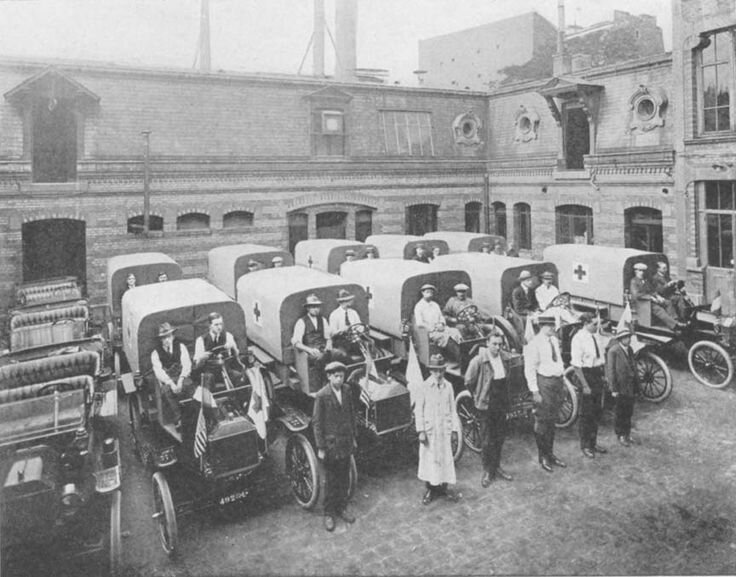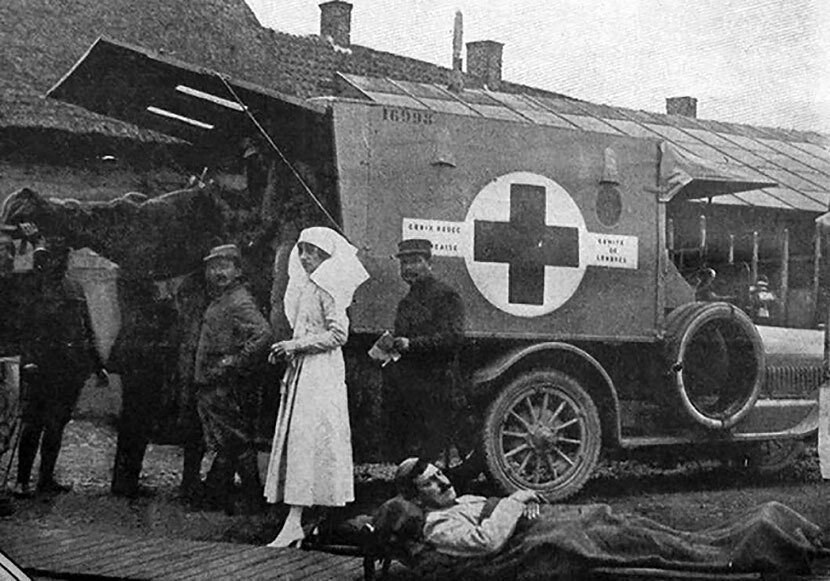By Johannes Allert
Following the Great War, several books and writings chronicling military medicine were published. Notable among them were Dr. Richard Derby’s Wade in Sanitary!: The Story of a Division Surgeon in France (published in 1919) and the classic by Army Nurse Julia Stimson, Finding Themselves: The Letters of an American Army Chief Nurse in a British Hospital in France (published in 1918). While each acknowledged the brutality of war and the challenges faced by medical personnel, the authors remained generally upbeat and confirmed the Allies’ just cause in prosecuting the war against Germany. In Wade in Sanitary!, Derby—the brother-in-law of Mrs. Theodore Roosevelt—specifically warns readers of the failure of preparedness and encourages vigilance against future threats.[1]
Conversely, Cynthia Wachtell has wisely resurrected the provocative composition of Ellen La Motte’s The Backwash of War. This work conveys an entirely different perspective of the World War during the low ebb period of the Allied war effort against the Central Powers. Enamored by La Motte’s personal story, Wachtell combed through the author’s book and numerous articles written during and after her involvement in the conflict, and provides insight into her unconventional, nonconformist life story.
Wachtell’s biography of La Motte is thorough. Born into wealth and privilege as a cousin of the successful DuPont family, Ellen La Motte attended private finishing schools to prepare her for a life of ease and refinement. Instead, LaMotte chose nursing as her profession—much to her family’s objections. Graduating from John Hopkins Hospital Training School for Nurses in 1899, she specialized in caring for tuberculosis patients. When war erupted on the European continent in 1914, La Motte volunteered for overseas duty and served at the American Ambulance Military Hospital in Paris and near the front lines.
Older, well-educated, and well trained in her profession, La Motte was unimpressed by the trappings of authority.She continually expresses disappointment with the military hierarchy and the aristocracy completely unprepared to fight, let alone treat and care for the mass casualties caused by modern industrial warfare. As with past wars, evacuation and treatment of the sick and wounded was often an afterthought in the minds of military planners. La Motte’s clinical analysis of the war’s effects on soldiers might be unfamiliar to those steeped in military science, but professionals in military medicine will quickly identify with her firsthand account of the types of wounds and illnesses encountered and the treatments employed.
Throughout her writing, La Motte is highly critical of the manner in which the wounded are treated, the upper echelons of command, and their mismanagement of and overall prosecution of the war. Among her more notable observations are her critiques concerning the lack of adequate and efficient evacuation of the wounded and mismanagement of medical assets and resources.[2]
While at the American Ambulance in Paris, La Motte witnessed the never-ending procession of well meaning but ill-trained and misguided socialites who voluntarily assisted with caring for the wounded but quickly discovered the unpleasant realities and challenges associated with patient care. Few remained committed to the task at hand.[3] The same held true for several orderlies who staffed the wards with one notable exception—a wealthy man who volunteered as an orderly after discovering a good many of his servants or their loved ones were killed or injured while in service to their country. Motivated by their loss, he was compelled to do something, no matter how insignificant. His selfless act was one instance where La Motte openly expressed admiration, hope and satisfaction.[4]

Paris American Ambulance Hospital (Pinterest)
Yet, in La Motte’s world, there were no heroes or villains, no victors or vanquished, only hapless victims caught in the maelstrom of a World War that upended civil society and exposed its flaws and shortcomings—hence the book’s title.[5]
During her time overseas, La Motte encountered the inconsistencies and contradictions of war. Although propaganda encouraged soldiers to fight for home and loved ones, wives were barred from visiting their injured or ill husbands lest these soldiers become demoralized by the news from home. However, other women of various stripes and professions were allowed entry into the war zone without question. To La Motte, this was contradictory and counterproductive to the war effort. In a society where the phrase Liberte, Egalite, Fraternite was used as a rallying cry against German oppression, she frequently questioned the wisdom and necessity of state censorship.[6] Her graphic descriptions of injuries, along with her critical analysis of the Allies’ prosecution of the war, were considered counterproductive to the war effort. Therefore, her publications were banned in England (1917-18) and later the United States (1918) only to resurface at the war’s bitter conclusion.
No clear explanation is given for La Motte’s sudden departure from war-torn Europe in 1916. After countless hours spent caring for the innumerable wounded and sick, the lack of a clear military breakthrough, or her near-death encounter at Ypres, perhaps she was just spent.[7] Yet the main coping mechanism that got her through the conflict was her ability to write.
Scant attention has been paid to those who cared for others during the Great War. The sheer physical and mental exhaustion combined with the lack of resources available to caregivers could, on occasion, have lasting effects. In one extreme instance, twin sisters from a prominent New York family who served overseas with the Red Cross were so overcome by their wartime experiences they committed suicide while on their return voyage home.[8] Fortunately for La Motte and others like her, her writing not only shed light on the cruel realities of war, it provided a measure of cathartic release from its insanity.[9]
Briefly, she returned to the United States with her life partner, Emily Crane Chadbourne. In August of 1916, traveling with Chadbourne in Asia, La Motte turned her attention to the negative impact of the international opium trade upon world health. She spent a year chronicling the problem before publishing a series of essays and books aimed at countering its dire influence. She returned to the United States and retired from public life in 1935. La Motte spent the remainder of her life with Chadbourne and died of natural causes in 1961. She was eighty-seven years old.[10]
One contemplates the extent to which La Motte might have altered her opinions had she remained in Europe long enough to witness the tide of war shift and the arrival of fresh medical assets from the United States once it entered the fray, or how U.S. Medical personnel might have benefited from her previous experiences. Critics might question the veracity of her experiences or the possibility that she embellished her encounters with military and state officials to market her work. If true, however, she would be among countless peers who were guilty of doing the same. As an avowed socialist and anarchist, readers may find her social and political leanings at odds with her desire to serve in what she considered a lost cause ineptly waged by a fading aristocracy. Yet, humanity and life experiences are rife with examples of shortcomings and contradictions that are beyond clear understanding which is why the subject of history remains so intriguing.

Mary Borden-Turner, who recruited Ellen La Motte as an army hospital nurse on the front, receives wounded soldiers from an ambulance. (Jane Conway / MaryBorden.com)
Whether its yesterday’s chemical warfare and shell shock, or today’s improvised explosive devices and Post Traumatic Stress Disorder, La Motte’s provocative no-nonsense style and clinical approach to medicine combined with her open critique of the military hierarchy’s approach to waging war, lack of forethought in treating casualties, and overall reaction to global conflict and injustices remains pertinent. Then as now, writing provided a necessary form of release by those who endured the conflict. Moreover, those responsible for waging war are encouraged to read La Motte’s work that illuminates war’s consequences and highlights the importance of sound planning in the treatment of the injured and sick. Though long since passed, La Motte challenges us to question overall war aims and methods employed by those in authority.
No comments:
Post a Comment